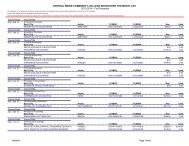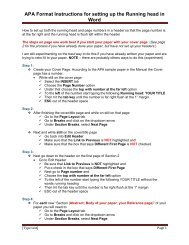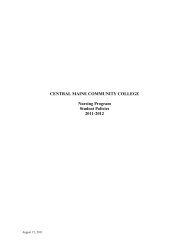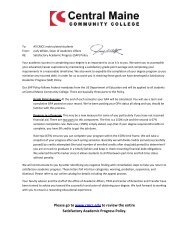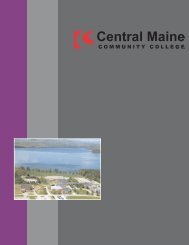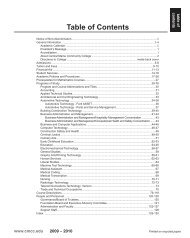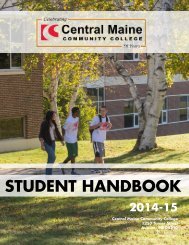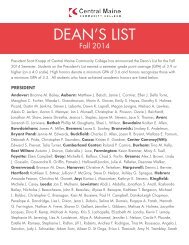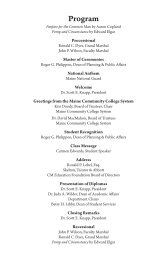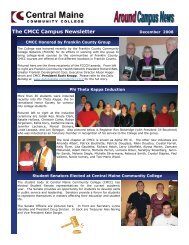Academic Policies and Procedures - Central Maine Community ...
Academic Policies and Procedures - Central Maine Community ...
Academic Policies and Procedures - Central Maine Community ...
Create successful ePaper yourself
Turn your PDF publications into a flip-book with our unique Google optimized e-Paper software.
course<br />
descriptions<br />
Course Descriptions<br />
moval, disassembly, repair, assembly of pumps,<br />
converters, gear train, shafts, bushings, case<br />
friction <strong>and</strong> reaction units, hydraulic <strong>and</strong> electronic<br />
shift control will be covered. Diagnosis<br />
<strong>and</strong> repair of clutch, transmission, trans axle,<br />
drive shaft, ring/pinion, axle shaft, differential<br />
case, <strong>and</strong> four-wheel drive components will be<br />
includ ed. Prerequisites: AUT 130 <strong>and</strong> 131.<br />
AUT 245 Manual Drive Train/Axles<br />
4 Credits (2.33 Lecture 0 Lab 1.67 Shop)<br />
7.34 Hrs/Wk (2.33 Hrs. Lecture 5.01 Shop)<br />
*15 wks<br />
This course will cover transmission theory <strong>and</strong><br />
power fl ow from the engine to the drive axle. Diagnosis<br />
<strong>and</strong> repair of clutch, transmission, trans<br />
axle, drive shaft, ring/ pinion, axle shaft, differential<br />
case, <strong>and</strong> four-wheel drive components<br />
will be includ ed. Prerequisite: AUT 240.<br />
AUT 270 Engine Performance II<br />
4 Credits (3 Lecture 0 Lab 1 Shop)<br />
6 Hrs/Wk (3 Hrs. Lecture 3 Hrs. Shop) *15 wks<br />
This course deals with engine performance principles<br />
as related to electronic feedback systems<br />
for fuel control, spark manage ment, emission<br />
controls <strong>and</strong> transmission related systems.<br />
Strategy based diagnosis will be emphasized<br />
using electronic diag nostic equipment. Prerequisites:<br />
AUT 156 <strong>and</strong> 157.<br />
AUT 271 Electronic Engine Control<br />
5 Credits (3 Lecture 0 Lab 2 Shop)<br />
9 Hrs/Wk (3 Hrs. Lecture 6 Hrs. Shop) *15 wks<br />
This course will cover all electronic compo nents<br />
found in today’s automobile. It also deals with<br />
engine performance principles as related to<br />
electronic feedback systems for fuel control,<br />
spark management, emis sion controls <strong>and</strong> related<br />
systems. Strate gy based diagnosis will be<br />
emphasized using electronic diagnostic equipment.<br />
The student will troubleshoot OBDII drivability<br />
faults as they relate to modern emission<br />
controlled engines <strong>and</strong> related systems. Diagnosis<br />
will lead to tests <strong>and</strong> repairs within the<br />
trade st<strong>and</strong>ards of time <strong>and</strong> accuracy. Prerequisite:<br />
AUT 159.<br />
AUT 275 Engine Performance III<br />
3 Credits (2 Lecture 0 Lab 1 Shop)<br />
5 Hrs/Wk (2 Hrs. Lecture 3 Hrs. Shop) *15 wks<br />
This course will cover all electronic components<br />
found in today’s automobile. The stu dent<br />
will troubleshoot OBDII drivability faults as they<br />
relate to modern emission controlled engines.<br />
Diagnosis leading to tests <strong>and</strong> repairs to trade<br />
st<strong>and</strong>ards of time <strong>and</strong> accuracy. Prerequisite:<br />
AUT 270.<br />
AUT 290 Advanced Chassis Systems<br />
1 Credit (1 Lecture 0 Lab 0 Shop)<br />
1 Hrs/Wk (1 Hr. Lecture) *15 wks<br />
This course will involve a comprehensive study<br />
of electronic <strong>and</strong> computerized brake, traction,<br />
suspension, steering, <strong>and</strong> alignment system of<br />
modern vehicles. A guide to practical experiences<br />
in analyzing problems <strong>and</strong> replacement<br />
of faulty sen sors <strong>and</strong> associated components<br />
will pro vide students with theory <strong>and</strong> procedures<br />
necessary to diagnose faults. Prerequisites:<br />
AUT 155 <strong>and</strong> 156.<br />
AUT 291 Advanced Chassis Systems Lab<br />
3 Credits (0 Lecture 0 Lab 3 Shop)<br />
9 Hrs/Wk (9 Hrs. Shop) *15 wks<br />
This course will involve a comprehensive study<br />
of electronic <strong>and</strong> computerized brake, traction,<br />
suspension, steering, <strong>and</strong> alignment systems of<br />
modern vehicles. The study of computer integrations<br />
with practical experiences in analyzing<br />
problems <strong>and</strong> replacement of faulty sen sors <strong>and</strong><br />
associated components will pro vide students<br />
with practical applications to classroom lectures.<br />
Prerequisites: AUT 155 <strong>and</strong> 156.<br />
AUT 296 Independent Study<br />
Variable Credit<br />
This provision allows for a performance contract<br />
between student <strong>and</strong> Department instructor(s)<br />
to reach mutually agreed upon goals. Credit<br />
earned <strong>and</strong> grade dependent upon quality <strong>and</strong><br />
efficiency of performance. (Credit hours are<br />
variable at a formula of 45 hours of student effort<br />
equaling 1 credit hour.) Prerequisite: Department<br />
Chair approval.<br />
Biology (BIO)<br />
BIO 101 Introduction to General Biology<br />
3 Credits (3 Lecture 0 Lab 0 Clinical)<br />
3 Hrs/Wk (3 Hrs. Lecture) *15 wks<br />
An introduction to the chemical <strong>and</strong> physical<br />
nature of biological processes intended<br />
for students who do not plan to major in<br />
biological science. Cell structure, metabolism,<br />
reproduction, inheritance, <strong>and</strong> evolution are<br />
examined in lecture <strong>and</strong> laboratory using a<br />
wide variety of plans <strong>and</strong> animals as examples<br />
<strong>and</strong> experimental models. Prerequisite: high<br />
school biology with lab or instructor permission.<br />
BIO 102 Introduction to General Biology<br />
1 Credit (0 Lecture 1 Lab 0 clinical)<br />
2 Hrs/Wk (2 Hrs. Lab) *15 wks<br />
Laboratory experiments designed to sup port the<br />
topics covered in BIO 101. Co-req uisite: BIO 101.<br />
BIO 104 Health <strong>and</strong> Wellness<br />
3 Credits (3 Lecture 0 Lab 0 Clinical)<br />
3 Hrs/Wk (3 Hrs. Lecture) *15 wks<br />
An introduction to the lifestyle skills that lead to<br />
better health. Course will include an overview of<br />
concepts involving the many aspects of health.<br />
Topics that will be covered include lifestyle<br />
choices <strong>and</strong> health, physical fitness, nutrition,<br />
weight management, stress management <strong>and</strong><br />
emotional health, healthy aging, addictions,<br />
environmental health <strong>and</strong> complementary <strong>and</strong><br />
alternative medicine. Students will participate<br />
in various activities including journaling <strong>and</strong> behavior<br />
assessments to help develop personalized<br />
lifestyle plans to improve overall health.<br />
BIO 105 Essentials of Human Anatomy <strong>and</strong><br />
Physiology<br />
3 Credits (3 Lecture 0 Lab 0 Clinical)<br />
3 Hrs/Wk (3 Hrs. Lecture) *15 wks<br />
This one semester course is designed to provide<br />
the student with rudimentary knowledge<br />
of human anatomy <strong>and</strong> physiology. This is a<br />
non-laboratory course that will cover the chemical<br />
basis of life, basic cell <strong>and</strong> tissue structure<br />
<strong>and</strong> all of the organ systems of the human body.<br />
Note: This course does not satisfy the requirements<br />
for programs such as nursing, clini cal lab<br />
science, or radiological technology. Prerequisites:<br />
BIO 101/102 or instructor permission.<br />
BIO 107 108 Introduction to Forensic Science<br />
4 Credits (3 Lecture 1 Lab 0 Clinical)<br />
4 Hrs/Wk (3 Hrs. Lecture 1 Hr. Lab) *15 wks<br />
These two courses, theory <strong>and</strong> laboratory, run<br />
concurrently <strong>and</strong> are designed to provide the<br />
student with an introduction to the scientific basis<br />
of forensic science techniques used in solving<br />
crime. Students will be introduced to the theory<br />
of crime scene processing as well as the analysis<br />
<strong>and</strong> interpretation of physical evidence. Prerequisites:<br />
A grade of C or higher in one of the following<br />
Life Science course: BIO 101-102, or BIO<br />
115-116. Co-requisite: ENG 123 <strong>and</strong> LCS 100.<br />
80 www.cmcc.edu 2010 ~ 2011



